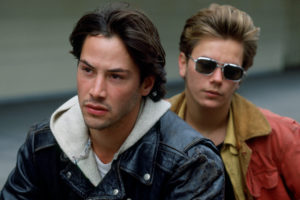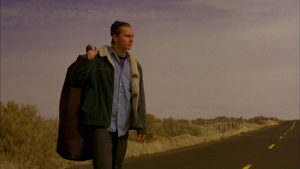Throwback Review: The Dreamy Landscape of 'My Own Private Idaho' (1991)

The following review contains spoilers.
My Own Private Idaho is a 1991 independent LGBT drama, the third feature film from director Gus Van Sant (Good Will Hunting, Milk). The story follows Mike Waters (River Phoenix), a narcoleptic street hustler in love with his best friend Scott Favor (Keanu Reeves).
The film opens with the definition of narcolepsy and then cuts to Mike entering the frame in a deserted Idaho landscape. Mike is confused and stuck in the middle of a road, dissociated from any clarity. He randomly falls asleep and dreams of his long-lost mother nurturing him. This is the hazy, mirage-like tone cast like a spell throughout the story. Van Sant uses his experimental avant-garde skills to capture a feeling of waking up in the middle of nowhere, devoid of a sense of time and space. The entire film feels like a dream, driven by surreal Western landscapes, mindscapes, and an ethereal slide guitar rendition of “America the Beautiful” (performed by Bill Stafford), which rolls in and out of the soundtrack.
The piece takes fascinating creative liberties referencing Shakespeare’s Henry the IV Parts I and II. Scenes at the “hotel” in Portland, Oregon, where Mike and Scott live with their fellow hustlers, recall Shakespeare using vaguely Elizabethan yet contemporary costumes, language, and music. In between the sex work, the drugs, and the use of the word “dude”, these degenerates pronounce a playful, transcendent timelessness in their roles.
Scott Favor (Reeves) embodies the Prince Harry role from Henry the IV Part I, a defiant, privileged teenager who, in this version, hustles in rebellion toward his father. Bob Pigeon (William Richert) is the Sir John Falstaff to Scott’s Prince Harry, while Scott’s father, Jack Favor, the Mayor of Portland, represents King Henry IV. “A plague on all cowards!” Bob belts as Mike and Scott step off a motorcycle and enter the hotel. “If manhood’s not forgotten on the face of the earth, then I’m a shot herring.”
On the flipside, Gus Van Sant utilized real Portland street hustlers as advisers and shot interview footage to inspire the actors, but ended up using the footage in the film. The trick to pulling off this approach is to achieve a non-confused, confident blurred line between the neo-Elizabethan dialect and the film’s otherwise improvisational documentary-like style. The film’s strange, dreamlike state supports this, making the Shakespearean moments feel almost like a heightened reality. Lines such as “The thieves scatter!” or “Are they such chickens?” feel different from the rest of the film’s more realistic dialogue, but not distractingly so. The modernized Shakespearean energy blends beautifully into realism as Mike and Scott leave the city and their humanity blooms.

Mike barely has any time during the day to live a life, much less keep up with the one he has. He tries to move his life forward in his search for his mother and pursues self-actualization, but his frequent narcoleptic attacks will not allow it. In the meantime, Mike gets by with sex work and hustling. This is not an optimistic character arc, but it is emotionally complex, and River Phoenix delivers. Every slight twitch of his fingers is this character doing it. There’s so much personality in each tense muscle shift, each cough, each blink, and each small outburst of energy—it’s magnetic.
Phoenix is photogenic and good-looking, but it’s more than that. He carries Mike like a real person, and his delivery appears thought-out and strategic but somehow improvisational and spontaneous. He is rigorously natural. Phoenix’s emotional chops gleam, but subtly, like a smoldering fire, especially in the campfire scene (which Phoenix wrote himself). Mike sits in front of a campfire, hunched over in a fetal position. “What do I mean to you?”, Mike asks Scott.
His low, restrained, confessional tone, lack of eye contact, the tenseness of his wrists, the way he seems to mentally crawl into a hole after telling Scott he loves him are all performative yet appear so natural. He looks like he knows precisely how to angle his face and how to hold himself with every emotion his character tunnels through. River Phoenix wrote this scene and fought for its inclusion in the final cut, insisting that this was Mike’s central scene, explaining his character. And Scott’s ambivalent discomfort reads in Reeves’s body language.
In this Italy scene linked below, River Phoenix disappears and manages to look like a completely different person, and it’s Mike, about to give up all hope in his search for his mother.
“’Idaho’ is the story of a rich boy who falls off the hill and a kid on the street. I saw a bit of the hill in Keanu’s personality and a bit of the street in River’s. They played out those extensions of themselves.” –Gus Van Sant
Scott concludes his life of hustling and rebellion (a “vacation” as he painted it) and trades in his found family and friends for money and power. He and his new Italian girlfriend have assimilated to high society after the death of his father, the mayor. Scott’s once-described “real father”, Bob Pigeon, has also died. Mike and the other hustlers loudly mourn and celebrate Bob’s life just yards away from the mayor’s cemetery funeral. Trying their best to ignore the degenerate “low-class” screams, the mayor’s funeral clan represents an Americanized nobility, sitting comfortably apart from the screaming lower class. Perhaps they are the Reagans and the Bushes, ignoring the cries of those affected by the AIDS crisis.
Keanu Reeves eloquently evokes a privileged boy sewing his wild oats, an heir to a very fortunate life he does not want. Phoenix’s Mike seems not to understand this. Mike wants to have had a “good upbringing” and a “normal dad” and imagines himself as a well-adjusted person if he had such comforts. But Scott says, “What is a normal dad?” Scott does not want the hand he has been dealt either, but Scott has a safety net and will be sadly wealthy, whereas Mike will sadly end up exactly where he started: in the middle of a deserted landscape with a long road both behind and in front of him.
My Own Private Idaho is a dreamy experience that is both visually stirring and vigorously well-acted. The screenplay combines Shakespearean language with naturalistic dialogue, beautifully executed in collaboration with the film’s writer/director and his performers. The practical use of effects and experimental dream logic still feel radical and modern. Gus Van Sant’s third feature is a bold, ambitious road film that quietly tackles classism and sexuality, subtly passing these concepts across through powerful character work and editing. A unique piece for many reasons, My Own Private Idaho continues to transcend most big-budget character-driven narratives made today, and its progressive creativity breathes life even thirty years later.
My Own Private Idaho is available to rent on YouTube and Amazon Prime.
See more reviews from Incluvie at www.cms.incluvie.com

More to explore
By Same Author
Related lists created by the same author
By General Category
Related Movie / TV / List / Topic
Living in The Real World in 'Dog Gone Trouble'
A pampered dog who gets lost and has to learn to live on his own while being flexible with surroundings.





